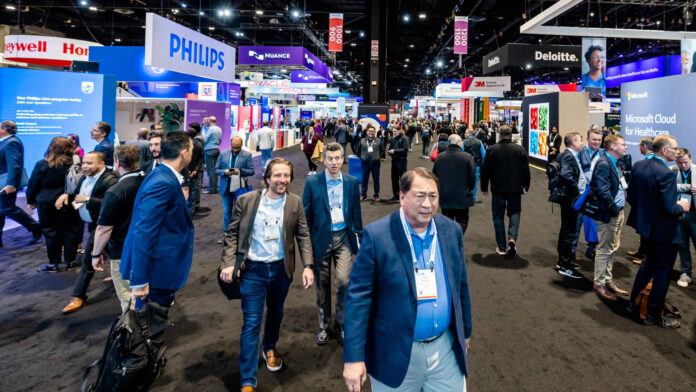Welcome to the HIMSS conference where workers, executives and engineers gather to talk about the latest advancements in health and technology. It’s like a big nerd party, except instead of beer pong, they’re discussing algorithms and AI. Companies like Microsoft, Google and Amazon have set up shop and are showing off their new health applications for AI. It’s like a tech farmer’s market, but instead of fruit and veggies, they’re selling cutting-edge medical technology. Panels of experts are on hand to answer tough questions, like how to solve staffing shortages and physician burnout. Who knew nerds could be such problem-solvers?
Generative AI was barely a thing a year ago, but it’s the new hotness now. Even the general public is talking about it thanks to Microsoft’s new chatbot, ChatGPT. Generative AI can use fairly complicated prompts from end users to generate text or images. And it’s not just the public that’s excited; the medical community is also captivated by this new technology. AI was the focus of the HIMSS conference’s opening keynote, leading to many jokes about how a chatbot could solve global health-care challenges. David Rhew, global chief medical officer at Microsoft, told CNBC that generative AI could be “transformative” for solving big problems in the health-care industry. Transformative is the medical nerd equivalent of saying “it’s a unicorn, but for nerds.”
Rhew wants to use AI for “high-impact, low-risk” uses for the technology, like streamlining administrative tasks. Basically, they want to get rid of all the boring stuff that steals time from doctors to free up more time to do cool stuff like treating patients (and playing video games, we assume). But, they can’t just go crazy with AI because developing diagnostic or patient-facing generative AI applications comes with significant regulatory questions. Think of AI as if the health-care industry has just been introduced to a car, but without the traffic lights, stop signs or roads yet. That’s a recipe for, well, disaster.
Administrative tasks require less regulatory oversight, so there is a real need for efficient solutions. As much as doctors want to pretend they’re all-powerful superhumans who can shoulder any task, the truth is that they need help with clerical work. A study funded by the American Medical Association in 2016 found that for every hour a physician spent with a patient, they spent an additional two hours on administrative work. We can’t even imagine how many hand cramps that leads to. HIMSS attendees believe generative AI can help with these tasks, which, let’s be honest, is the best news since sliced bread.
Microsoft announced an expanded partnership with Epic Systems, a health-care software company that helps hospitals store, share and access electronic health records. It’s the perfect match. Epic’s first application of AI technology automatically generates draft responses to the messages that physicians receive from patients. The physicians don’t have to use the suggested draft at all, but it saves them time if they choose to edit or send it. Think of the AI application as a personal assistant, but without the annoying “I know more than you” attitude.
AI isn’t just saving doctors time, it’s helping them diagnose patients. Seth Hain, senior vice president of R&D at Epic, says that in the future, AI could serve as an impactful hypothesis generation tool for physicians. They will be able to ask patient-specific questions like, “What do you think I should look at next in regard to this problem?” In a live demo at HIMSS, Nuance Communications previewed future projects and showcased an application called DAX Express, which helps reduce clinicians’ administrative burdens by automatically drafting a clinical note within seconds after a patient visit. There were gasps and joyful exclamations from some of the physicians, nurses and healthcare workers in the room. They’re like cheerleaders for AI – it’s almost cute.
In conclusion, humans and AI are now co-workers in the health industry, and honestly, it kinda seems like they are doing most of the work. Maybe the doctors will just show up in the future to press buttons and sign paperwork. One can only hope.
Serious News: cnbc

